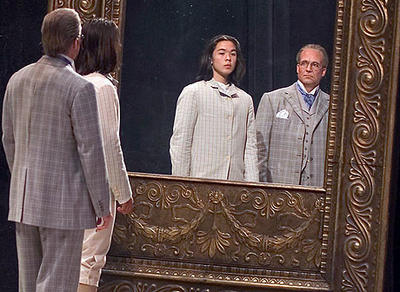Summer Opera: Death in Venice at Glimmerglass
 As far as I know, this is not a significant anniversary year for Britten. So, what reason can there be to explain why this seems to be the Year of Britten at summer opera festivals? Ionarts has reviewed Gloriana at Opera Theatre of St. Louis and Peter Grimes at Santa Fe Opera, but those are not the only Britten productions this summer. In Opera in the Summer 2005, I noted the production of one of my favorites, the malevolent The Turn of the Screw (1954), which was at the Festival d'Aix-en-Provence in July (I didn't find any reviews). Back in the United States, Glimmerglass Opera is performing another of Britten's darker operas, Death in Venice (1973), through August 21. Martin Bernheimer was up in New York to review the production, along with the Donizetti (Death in Venice/Lucie de Lammermoor, New York, August 3) for the London Financial Times:
As far as I know, this is not a significant anniversary year for Britten. So, what reason can there be to explain why this seems to be the Year of Britten at summer opera festivals? Ionarts has reviewed Gloriana at Opera Theatre of St. Louis and Peter Grimes at Santa Fe Opera, but those are not the only Britten productions this summer. In Opera in the Summer 2005, I noted the production of one of my favorites, the malevolent The Turn of the Screw (1954), which was at the Festival d'Aix-en-Provence in July (I didn't find any reviews). Back in the United States, Glimmerglass Opera is performing another of Britten's darker operas, Death in Venice (1973), through August 21. Martin Bernheimer was up in New York to review the production, along with the Donizetti (Death in Venice/Lucie de Lammermoor, New York, August 3) for the London Financial Times:
At the Glimmerglass Festival, a mirage amid the Leatherstocking hills of Cooperstown, the latest adventure involves Death in Venice. This fragile translation of Thomas Mann’s complex novella is the sixth opera by Benjamin Britten to be staged here in 18 years. Unfortunately, the premiere on Saturday suggested a labour of respect, not love. Call it “Death Without Venice.” [...]
The production staged by Tazewell Thompson and designed by Donald Eastman plays slow and loose with core values. All the action, even the finale on the sand, takes place in a lobby. Logic is defied, stylisation mocked, narrative obscured. "Death in Venice" becomes just another soapy saga of comings and goings in a grand hotel. Elegant ensemble uniforms by Carrie Robbins blur class and character distinctions. Scott Chiba, the young man cast as Tadzio, looks too knowing, too muscular, too mature to convey the crucial aura of innocence. Musical compensation is provided by the sensitively detailed, propulsive conducting of Stewart Robertson. William Burden emerges as too youthful, too handsome, too healthy, too mellifluous, however, to make Aschenbach’s decay plausible, much less poignant. David Pittsinger does what he can to enliven the multiple duties of his crusty antagonists but it is a losing battle. Everything seems so trivial, so grey.
David Shengold, Burden and Burton: Two American singers dominate Cooperstown’s summer opera (Gay City News, August 11) Ben Mattison, Photo Journal: Death in Venice at Glimmerglass Opera (Playbill Arts, August 7) Wayne Myers, Glimmerglass Opera's 'Death in Venice' an atmospheric tour de force (Oneida Daily Dispatch, July 27) |
"Death in Venice," seen on Sunday, [w]as the worthiest of this year's little-known crop. And it, too, was uneven. This is a director's opera, requiring a strong hand, and Tazewell Thompson was partly successful, offering a production so sensitive to the nuances of the piece as to be now illuminating, now too muted and occasionally misguided. Illuminating moments included visual reactions to the music: a flood of light transforming the set from dingy to elegant as the music surges up in a clean rich wave. Muted ones included the sedate chorus sitting and singing as the boys engage in stylized gymnastics, not utterly convincing, on the beach.It's a difficult opera in many ways and a gutsy bit of programming for Glimmerglass. I wonder what the sales numbers were like, although I don't want to suggest that ticket sales should be the only determining factor in an opera company's programming. The two Britten productions I saw this summer were both, as far as I could tell, nearly or fully sold out. That is a good sign. Tomorrow, I'll have some reviews of Britten's Paul Bunyan at Central City Opera in Colorado.
Misguided, unfortunately, was the casting of Scott Chiba as Tadzio: he is beautiful but too old and too self-aware a dancer to be convincing as a lovely boy on the cusp of adolescence. Stewart Robertson conducted adequately. One of the happiest parts of the whole thing was the excellent performance of William Burden, who gave a careful characterization of Aschenbach and sang fantastically. It is this kind of performance, in a beautiful theater that's a perfect small size for opera, in a work we have too few opportunities to hear, that demonstrates the strengths of Glimmerglass. Innovation for its own sake has nothing to do with it.





















































No comments:
Post a Comment